| Ray
Hurford, creator of Small Axe, that most
excellent of reggae fanzines (now on the
web) is a well loved and respected reggae
fanatic. Turning his hand to producing the
music he loved near the turn of the century,
2001 saw released of Original Version -- the
first of four albums from his outfit The
Small Axe People.
This was one of the most intriguing
and singular reggae records ever. It has
inspired some very strange and extreme
reactions and it certainly got some curious
reviews. It was compared by various
reviewers to Steve Reich, Daniel Miller's
Silicon Teens, early Lee Perry and Lloyd
Barnes' productions, Prince Jazzbo's early
digital rhythms, and to Berlin outfit Rhythm
and Sound.
Ray was kind enough to speak to Pete
Murder Tone recently about the early days of
The Small Axe People.
----------------
Part One: Origins + Making the first LP.
What made you want to start making your
own reggae tunes, to make the transition
from reggae fan and writer to music maker?
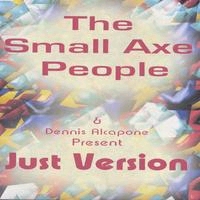 I
wanted to make a version album back in the
late seventies early eighties, but when I
checked out the cost of studio time and
musicians - I dropped the idea - but then I
bought a bass and Dr Rhythm drum machine -
and started to build record bass and drum
tracks on my cassette deck, and did about 12
tracks but then the deck stopped working it
couldn't deal with the bass! But the tape
was given to Rae Wackies (footnote),
who really liked them. I was hoping to be
able to transfer them onto a multi track,
but the tape got lost and that was that. I
wanted to make a version album back in the
late seventies early eighties, but when I
checked out the cost of studio time and
musicians - I dropped the idea - but then I
bought a bass and Dr Rhythm drum machine -
and started to build record bass and drum
tracks on my cassette deck, and did about 12
tracks but then the deck stopped working it
couldn't deal with the bass! But the tape
was given to Rae Wackies (footnote),
who really liked them. I was hoping to be
able to transfer them onto a multi track,
but the tape got lost and that was that.
To get the sound I wanted, I knew would
take some a lot of studio time which costs
money. And by the mid eighties - Tero Kaski
at Black Star in Finland thought it would be
a great idea to put out a book. Which was to
be More Axe - and that meant setting up a
business (Muzik Tree) and that took every
penny I had. So the thing was put on hold.
Did you have a guiding musical concept
or philosophy when you started?
The sound I had in mind was that raw
sound of the early seventies - Version. It
was minimal - and was driven more by
keyboards and guitars, then bass and drum.
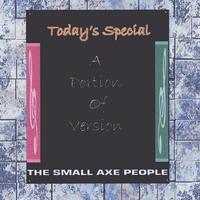 By
the 1994, the cost of computers that could
handle music had come Down to a good price -
I wanted an Atari, but couldn't get one. So
ended up buying a Brother Disk Composer, and
a Yamaha keyboard with midi - It took a
while to adapt from playing bass guitar to
keyboard bass - but within a while I had a
number of rhythms built. It was then that I
asked Dave Katz to come and play some
melodies over them - he did . I thought what
he did was great - he got the sound I was
after very quickly. I then tried to mix the
tunes and it couldn't be done! The only way
to mix midi then, was to transfer it to
tape, track by track. And then mix it. The
cost of this was way too much. By
the 1994, the cost of computers that could
handle music had come Down to a good price -
I wanted an Atari, but couldn't get one. So
ended up buying a Brother Disk Composer, and
a Yamaha keyboard with midi - It took a
while to adapt from playing bass guitar to
keyboard bass - but within a while I had a
number of rhythms built. It was then that I
asked Dave Katz to come and play some
melodies over them - he did . I thought what
he did was great - he got the sound I was
after very quickly. I then tried to mix the
tunes and it couldn't be done! The only way
to mix midi then, was to transfer it to
tape, track by track. And then mix it. The
cost of this was way too much.
So I just left it again, and kept an eye
on the cost of 4 track tape Machines to my
total surprise Yamaha put out a 4-track
Minidisc machine! Being a big fan of
Minidisc. I had to get this machine, it was
like a dream come true. Ira at Jammyland in
New York was looking to buy old 12" and
so that was that. By the late summer of 2000
I had the Yamaha MD4S.
I understand that the next step was
producing the first album "Original
Version" (2001). Tell us about how you
made this record and how you went about
releasing/distributing it..
The first album by The Small Axe People
was ready to go by the end of That year. Rae
Wackies came and mixed some tracks in the
middle of 2001 and Roger Dalke came up with
the title of the album - 'Original Version'.
When it came to its release I just wanted to
put it out on a small run, no more than 200
CDs. But John Mason at Reggae Retro claimed
he could get a lot more done at a very good
price, and set up distribution through SRD.
This is where things went seriously wrong,
SRD did OK with the CD, but John Mason seems
to think that's it OK not to pay people. To
this day the matter is not resolved.
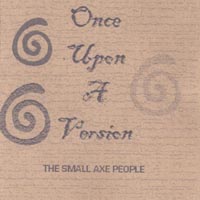 Regarding
the music on the album there is a drum
machine, but that's it, there are no samples
on 'Original Version'. It's a version album,
not a dub album. Dub concentrates on bass
and drum, and studio FX. My interest is
elsewhere. The interplay between the piano
and organ for example. Reggae people don't
really know what version is. Even albums
that are really Version sets, are sold as
Dub or instrumental - but they are not
either. 'Musical Bones' and 'Return Of Wax'
are version albums. Regarding
the music on the album there is a drum
machine, but that's it, there are no samples
on 'Original Version'. It's a version album,
not a dub album. Dub concentrates on bass
and drum, and studio FX. My interest is
elsewhere. The interplay between the piano
and organ for example. Reggae people don't
really know what version is. Even albums
that are really Version sets, are sold as
Dub or instrumental - but they are not
either. 'Musical Bones' and 'Return Of Wax'
are version albums.
Rae Wackies told me early on that I
wouldn't be able to get the kind of sound I
wanted with a four track and he was right.
Reggae sounds simple but its not, you need a
band or a minimum of a eight tracks to get
it right.
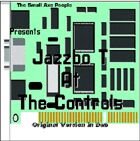 But
theres a dub version of the album too.. But
theres a dub version of the album too..
Dub kinda lost its appeal to me I wasn't
interested in making Dub, there is a dub to
'Original Version' 'Jazzbo T At The
Controls. Which is Roger Dalke using the
Cool Edit program to dub up the tracks. Once
again its very minimal, but I like it a lot.
While many of the sounds on
"Original Version" are quite
electronic it doesn't sound nearly as rigid
or programmed to the extent of other digital
reggae...
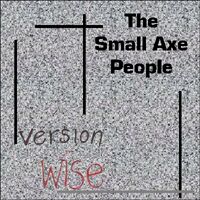 'Original
Version' was recorded live, it's not a midi
album. Only a drum machine program. So the
drums were put on one track, then the bass,
and then the organ and piano/clavinet. 'Original
Version' was recorded live, it's not a midi
album. Only a drum machine program. So the
drums were put on one track, then the bass,
and then the organ and piano/clavinet.
It's very difficult to get the kind of
drum sound I wanted, but it had the right
feel.
You have spoken about the importance of
Version to your work: more specifically who
were some of your musical influences at this
point?
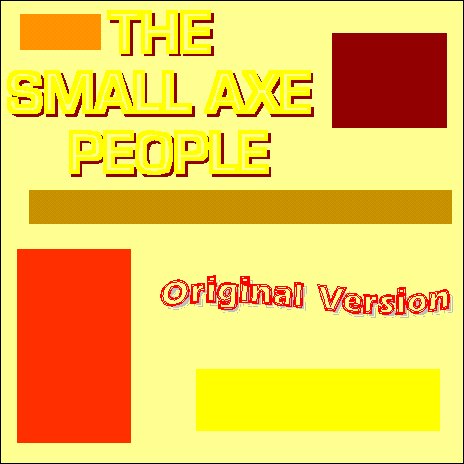 Firstly
Andy Capp: 'Pop A Top' and 'The Law' are the
blueprints for all of what I have done. I
would love to talk to Andy Capp about
version Herman Chin Loy is another person
who understands the concept of Version, and
so of course does Lee Perry. Firstly
Andy Capp: 'Pop A Top' and 'The Law' are the
blueprints for all of what I have done. I
would love to talk to Andy Capp about
version Herman Chin Loy is another person
who understands the concept of Version, and
so of course does Lee Perry.
Cheers Ray!
FOOTNOTE: Rae
Wackies is the Mystic Red Corporation, he
produced the first 'UK Roots' tune 'Seven
Seals' with Manasseh before they were
Manasseh. His own album 'Between Zero and
One' is a roots classic. Check out Idlers
Rest for more info.[back]
|
















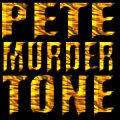
 I
wanted to make a version album back in the
late seventies early eighties, but when I
checked out the cost of studio time and
musicians - I dropped the idea - but then I
bought a bass and Dr Rhythm drum machine -
and started to build record bass and drum
tracks on my cassette deck, and did about 12
tracks but then the deck stopped working it
couldn't deal with the bass! But the tape
was given to Rae Wackies
I
wanted to make a version album back in the
late seventies early eighties, but when I
checked out the cost of studio time and
musicians - I dropped the idea - but then I
bought a bass and Dr Rhythm drum machine -
and started to build record bass and drum
tracks on my cassette deck, and did about 12
tracks but then the deck stopped working it
couldn't deal with the bass! But the tape
was given to Rae Wackies  By
the 1994, the cost of computers that could
handle music had come Down to a good price -
I wanted an Atari, but couldn't get one. So
ended up buying a Brother Disk Composer, and
a Yamaha keyboard with midi - It took a
while to adapt from playing bass guitar to
keyboard bass - but within a while I had a
number of rhythms built. It was then that I
asked Dave Katz to come and play some
melodies over them - he did . I thought what
he did was great - he got the sound I was
after very quickly. I then tried to mix the
tunes and it couldn't be done! The only way
to mix midi then, was to transfer it to
tape, track by track. And then mix it. The
cost of this was way too much.
By
the 1994, the cost of computers that could
handle music had come Down to a good price -
I wanted an Atari, but couldn't get one. So
ended up buying a Brother Disk Composer, and
a Yamaha keyboard with midi - It took a
while to adapt from playing bass guitar to
keyboard bass - but within a while I had a
number of rhythms built. It was then that I
asked Dave Katz to come and play some
melodies over them - he did . I thought what
he did was great - he got the sound I was
after very quickly. I then tried to mix the
tunes and it couldn't be done! The only way
to mix midi then, was to transfer it to
tape, track by track. And then mix it. The
cost of this was way too much. Regarding
the music on the album there is a drum
machine, but that's it, there are no samples
on 'Original Version'. It's a version album,
not a dub album. Dub concentrates on bass
and drum, and studio FX. My interest is
elsewhere. The interplay between the piano
and organ for example. Reggae people don't
really know what version is. Even albums
that are really Version sets, are sold as
Dub or instrumental - but they are not
either. 'Musical Bones' and 'Return Of Wax'
are version albums.
Regarding
the music on the album there is a drum
machine, but that's it, there are no samples
on 'Original Version'. It's a version album,
not a dub album. Dub concentrates on bass
and drum, and studio FX. My interest is
elsewhere. The interplay between the piano
and organ for example. Reggae people don't
really know what version is. Even albums
that are really Version sets, are sold as
Dub or instrumental - but they are not
either. 'Musical Bones' and 'Return Of Wax'
are version albums. But
theres a dub version of the album too..
But
theres a dub version of the album too.. 'Original
Version' was recorded live, it's not a midi
album. Only a drum machine program. So the
drums were put on one track, then the bass,
and then the organ and piano/clavinet.
'Original
Version' was recorded live, it's not a midi
album. Only a drum machine program. So the
drums were put on one track, then the bass,
and then the organ and piano/clavinet. Firstly
Andy Capp: 'Pop A Top' and 'The Law' are the
blueprints for all of what I have done. I
would love to talk to Andy Capp about
version Herman Chin Loy is another person
who understands the concept of Version, and
so of course does Lee Perry.
Firstly
Andy Capp: 'Pop A Top' and 'The Law' are the
blueprints for all of what I have done. I
would love to talk to Andy Capp about
version Herman Chin Loy is another person
who understands the concept of Version, and
so of course does Lee Perry.













